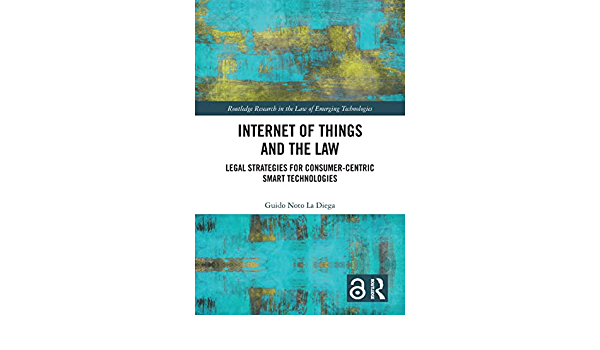Ai Act and Intellectual Property in the Digital Transition Curatori: Mario FRANZOSI, Oreste POLLICINO, Gianluca CAMPUS Prefazione di: Gustavo GHIDINI Postfazione di: Stefano LONGHINI Autori…
Internet of Things and the Law. Legal Strategies for Consumer-Centric Smart Technologies

Internet of Things and the Law
Legal Strategies for Consumer-Centric Smart Technologies
By
Copyright Year 2023
Book Description
Internet of Things and the Law: Legal Strategies for Consumer-Centric Smart Technologies is the most comprehensive and up-to-date analysis of the legal issues in the Internet of Things (IoT). For decades, the decreasing importance of tangible wealth and power – and the increasing significance of their disembodied counterparts – has been the subject of much legal research. For some time now, legal scholars have grappled with how laws drafted for tangible property and predigital ‘offline’ technologies can cope with dematerialisation, digitalisation, and the internet. As dematerialisation continues, this book aims to illuminate the opposite movement: rematerialisation, namely, the return of data, knowledge, and power within a physical ‘smart’ world. This development frames the book’s central question: can the law steer rematerialisation in a human-centric and socially just direction? To answer it, the book focuses on the IoT, the sociotechnological phenomenon that is primarily responsible for this shift. After a thorough analysis of how existing laws can be interpreted to empower IoT end users, Noto La Diega leaves us with the fundamental question of what happens when the law fails us and concludes with a call for collective resistance against ‘smart’ capitalism.
Table of Contents
Introduction
1. IoT Law: Obstacles and Alternatives in the Regulation of a Non-Binary Sociotechnological Phenomenon
2. The Internet of Spying Sex Toys, Killer Petrol Stations, and Manipulative Toasters: A View of Private Ordering from the Contractual Quagmire
3. The Internet of Contracts: The Tension between Consumer Contract Laws and IoT Imbalance
4. The Internet of Vulnerabilities. Tackling Human and Product Vulnerabilities through Noncontractual Consumer Laws
5. The Internet of Loos, the General Data Protection Regulation, and Digital Dispossession under Surveillance Capitalism
6. The Internet of Things (You Don’t Own) under Bourgeois Law: An Integrated Tactic to Rebalance Intellectual Property
Conclusion: When the Law Fails Us: The Commons for a Collectivised and Open IoT
Biography
Dr Guido Noto La Diega (he/they) is an award-winning Scotland-based Sicily-born academic with a passion for law and technology. They are Associate Professor of Intellectual Property and Privacy Law at the University of Stirling, Faculty of Arts and Humanities. At Stirling, Noto La Diega leads the Royal Society of Edinburgh Research Network SCOTLIN (Scottish Law and Innovation Network); is Deputy Chair of the Faculty’s Equality, Diversity, and Inclusion Committee; and carries out research at the Centre for Research into Information, Surveillance, and Privacy (CRISP). Currently, they are leading the AHRC-DfG-funded international research project ‘From Smart Technologies to Smart Consumer Laws: Comparative Perspectives from Germany and the United Kingdom’, in partnership with the universities of Osnabrück, Warwick, and Bonn. Outside of Stirling, Noto La Diega is Member of the European Commission’s Expert Group on AI and Data in Education and Training, Fellow of the Nexa Center for Internet and Society, Research Associate at the UCL Centre for Blockchain Technologies, and Co-Convenor of the Open Section of the Society of Legal Scholars, the oldest and largest society of law academics in the UK and the Republic of Ireland. Noto La Diega’s main expertise is in Internet of Things, artificial intelligence, cloud computing, robotics, and blockchain. Their work is animated by the conviction that the law should be pivotal to human-centric, and socially just sustainable technologies.








